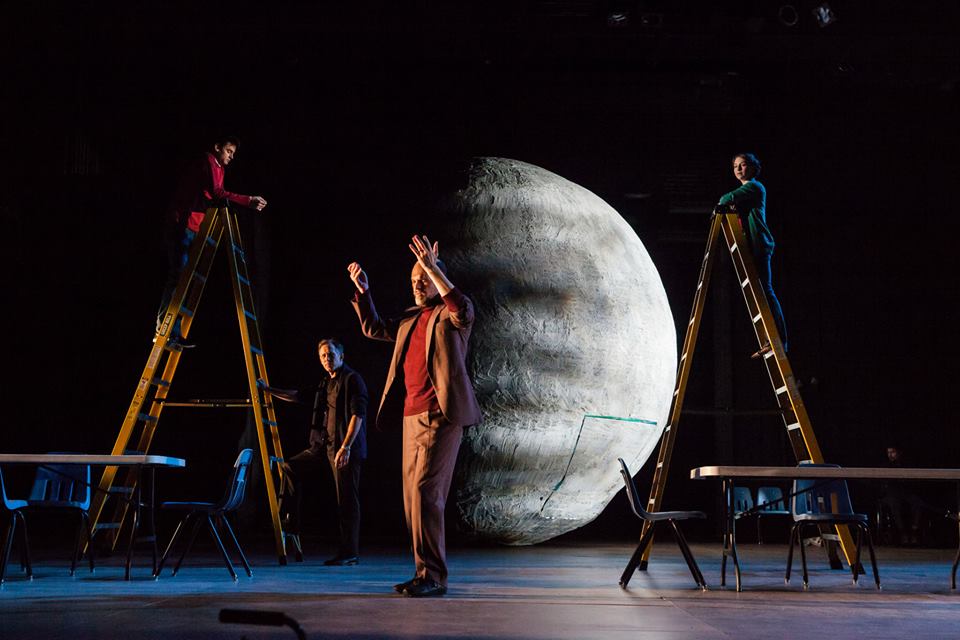Twelve-hour Greek plays, white face, drag queens, gender parity. It’s not exactly raindrops on roses or whiskers on kittens, but when you ask: “What was your favorite thing this year in the theatre?” you will get a different answer, depending on who you ask and where that person lives.
Keeping that in mind, we asked theatre critics/occasional American Theatre contributors from all over the country to tell us their favorite show/moment/theatre-related-thing from this year. Their varied responses, with input from the AT editors, are below.
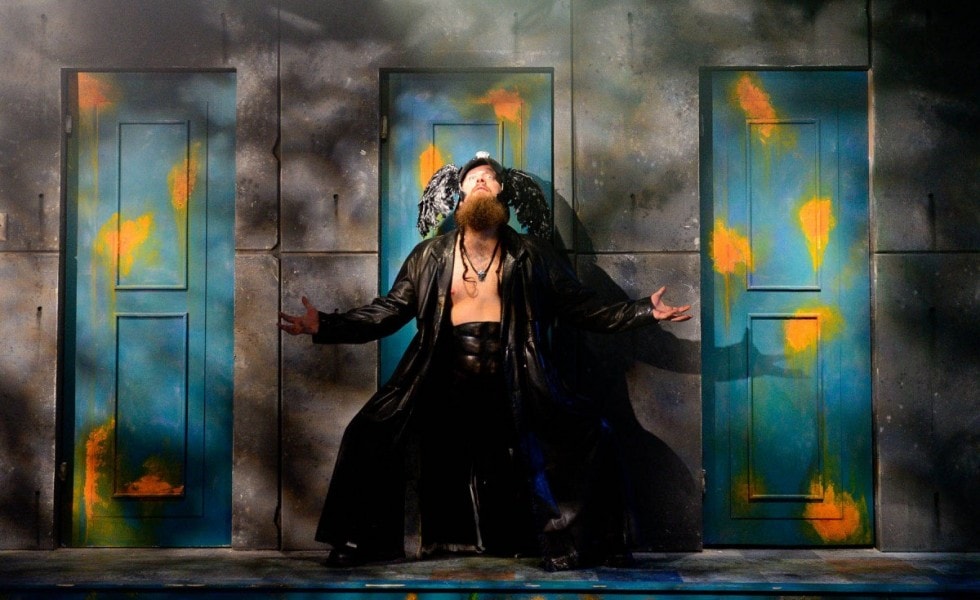
Two Votes for Tragedy
Kris Vire, associate editor, Time Out Chicago: The Hypocrites’ All Our Tragic, a 12-hour-long free adaptation of all 32 surviving tragedies by Sophocles, Aeschylus and Euripides, was my favorite event—and I do mean event—of the year in Chicago theater. Adapter-director Sean Graney massaged his source texts into a single, powerful narrative enacted by 20 seemingly tireless actors, with strategically placed intermissions and meal breaks—conversation breaks, really—helping make Tragic an experience as communal as it was durational. It’s set for a remount in June, and I can’t wait to spend another day revisiting it.
Kerry Reid, freelance critic and regular contributor, the Chicago Tribune: At the end of Sean Graney’s 12-hour staging of All Our Tragic for the Hypocrites in their brand-new venue at the Den Theatre in Chicago’s Wicker Park neighborhood, the indefatigable cast gathered onstage and sang Stephen Foster’s “Hard Times Come Again No More.” In the car on the way home—and for a few days afterward on social media—the friends with whom I saw the show debated that ending. Was it a feel-good cop-out from confronting the consequences of the never-ending cycle of horrors we had just witnessed? Or was it a necessary balm for an audience and artists who had been sharing this world for so many hours, and a reminder that the hard times will never stop coming and so we must be prepared to face them with grace and compassion? I tend to lean toward the latter, but it’s a testament to the power of Graney’s show that I am still thinking about that debate months later. And I can’t wait to see it again next summer.
Fire in Chicago
Suzy Evans, managing editor, American Theatre, New York City: Burning Bluebeard, a show about a theatre fire where much of the audience was burned alive, doesn’t exactly sound like upbeat stage fare, but the Ruffians have created a delightfully engaging (and yes, also heart-wrenching) clowning take on the 1903 Iroquois Theater fire. I saw the production at Theater Wit in Chicago over a long weekend. When the aerialist, who (spoiler alert) was the only performer to perish in the flames, tells her story, I was simultaneously filled with hope and heartbreak, knowing the untimely end was inevitable. What I didn’t know was that as an audience member, I would feel like a participant past the point of comfort. The effect was blinding.
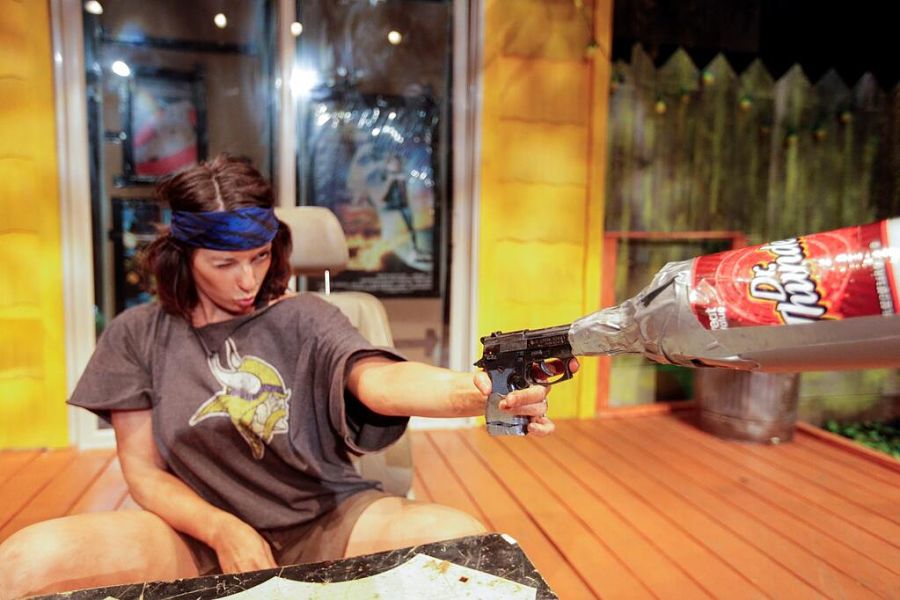
Some Like It Hot
Lindsey Wilson, theatre critic, D Magazine, Dallas: Playwright Matt Lyle wisely capitalized on our current obsessions—zombies, hipsters, Pinterest-inspired “keeping up with the Joneses”—and turned them into Barbecue Apocalypse, a show I enjoyed so much at Kitchen Dog Theater that I actually paid to see it again. This clever, funny spin on a dinner party gone horribly awry allowed the dynamite ensemble cast to shine under Lee Trull’s direction, and many clever nods to disaster tropes played well with the macabre take on social satire. The cast was clearly having fun with this smart, silly comedy—and so did we.
A Free Shot of Scotch
Robert Faires, arts editor, Austin Chronicle, Tex.: The warmest glow I experienced in the theatre all year came from The Strange Undoing of Prudencia Hart, a lively tall tale from the National Theatre of Scotland, when it came into town and played at Texas Performing Arts. Transforming a theatre stage into a pub in which the audience was seated, five exuberant performers spun the fanciful yarn of a forlorn academic who gets trapped in the Devil’s B&B. The delightfully clever script (penned almost completely in rhyming couplets) and playful theatricality turned audience members into motorbikes and created blizzards out of shredded bar napkins. The show was as intoxicating as a shot of Scotch—which the company provided to everyone in the house, gratis.
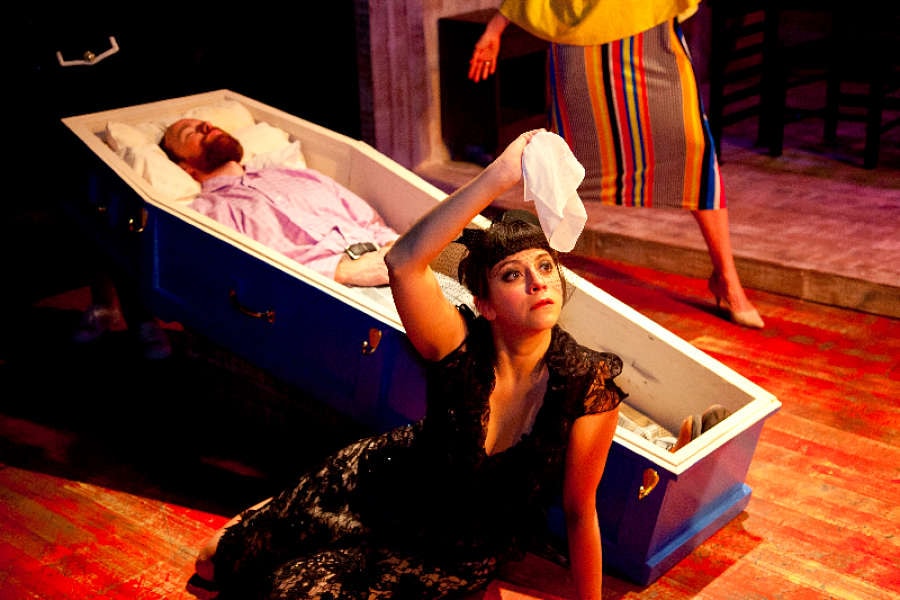
A Delightful Suicide
Stacy Alexander Smith, freelance journalist, Austin, Tex.: Whodathunk a show called The Suicide could be delightful? Nikolai Erdman’s 1928 Russian slapstick tragedy was given the Paper Chairs ensemble treatment at the Off Center. Thanks to Lisa Laratta’s artful set, the prismacolor powerhouse work of lighting designers Natalie George and Jen Rogers, along with Paper Chairs’s masterful ensemble work, Erdman’s rebel yell from the Stalin era seemed shiny and new.
Enormity and Elegance
Wendy Rosenfield, theatre critic, Philadelphia Inquirer and Broad Street Review: This year’s FringeArts Festival brought work by Romeo Castellucci to Philly for the second year in a row, this time with The Four Seasons Restaurant. Named after an incident in which painter Mark Rothko refused to complete a commissioned piece, this production is all about absence, and begins with an extended, seat-rattling recording of the sound inside a black hole (we were handed earplugs upon entry). The show’s sheer enormity and visual elegance reminded me so much of Lars Von Trier’s film Melancholia, and it left me utterly awestruck, shaken and fighting back tears. You don’t get a night out like that very often.
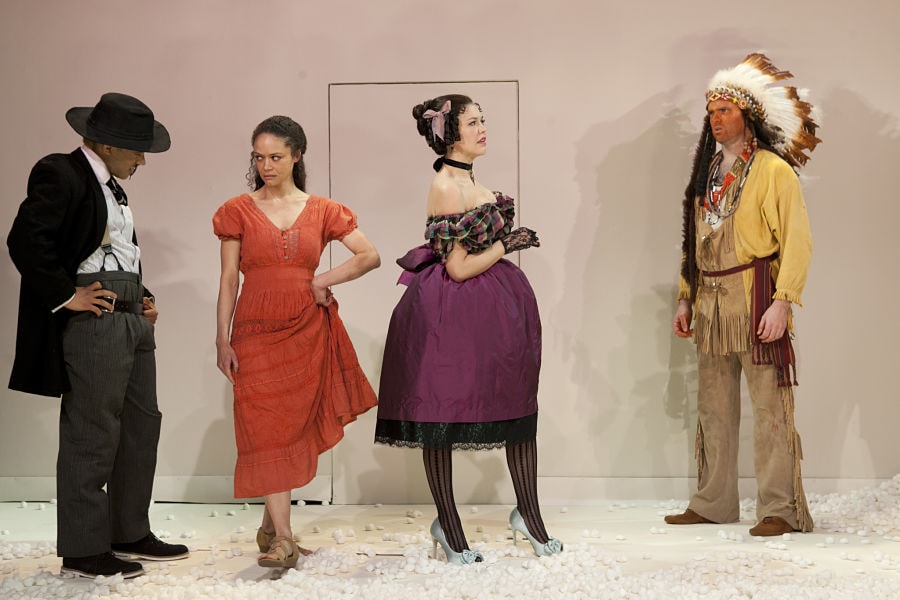
Laughing, Uncomfortably, About Race
Diep Tran, associate editor, American Theatre, New York City: When was the last time you saw a play about race that made you laugh? Well, that’s what I did during Branden Jacobs-Jenkins‘s An Octoroon during its run at Soho Rep. I felt vaguely uncomfortable afterward, but that was the point. In this reinvention/satire of Dion Boucicault’s The Octoroon, blackface, whiteface and the 19th-century slave narrative are put into a blender and whipped up until what’s left is a biting, messy, cotton-ball-filled evisceration of the race play, old and new. More than a century after the Emancipation Proclamation, we still lack the proper tools when it comes to talking about, and dealing with, race. Also, seeing Jacobs-Jenkins cameo in his own play as a stagehand in a white rabbit head was an added treat. An Octoroon will be remounted at Theatre for a New Audience in Brooklyn in 2015, and I cannot wait to be uncomfortable again.
Four Scores and a Few Months Ago
Rob Weinert-Kendt, senior editor, American Theatre, New York City: In the space of a few weeks this past fall, I saw four shows of wildly varying types, sizes and quality, but what they all had in common was some of the best theatre music I heard all year, or in many years: On the Town, in an ebullient Broadway revival (which started out at Barrington Stage) of a piece of quintessential period froth with a brash, tuneful score by a young Leonard Bernstein that I was happy to have stuck in my head for weeks; Ghost Quartet, Dave Malloy’s mesmerizing, sensory-immersive album-as-theatre piece at the Bushwick Starr (coming back in January to Sleep No More‘s McKittrick Hotel); The Last Ship on Broadway, which despite a flawed book has an honest-to-goodness great, gorgeous score by Sting; and The Fortress of Solitude at the Public Theater, an impossibly ambitious adaptation at of Jonathan Lethem’s complicated novel whose central strength was Michael Friedman’s sinuous pop-polymath score.
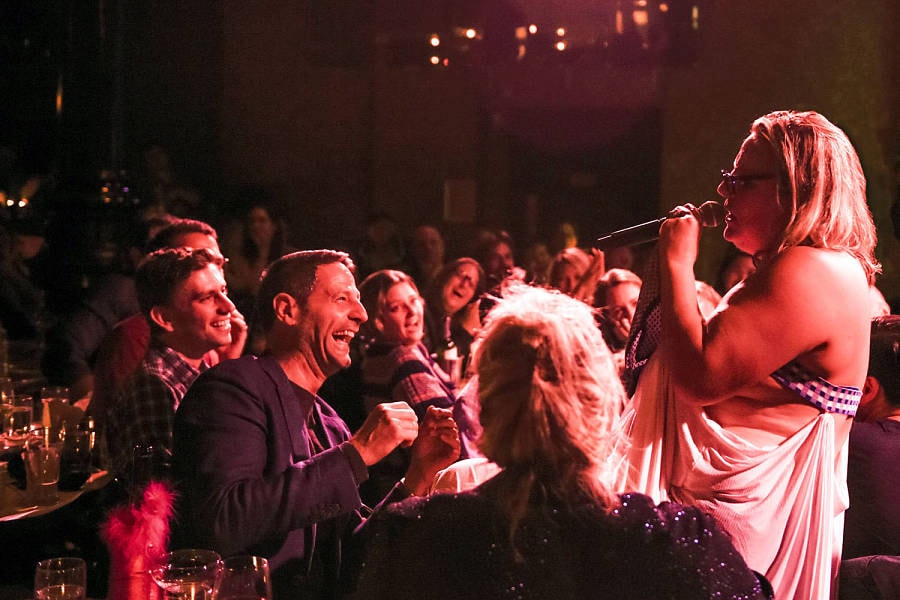
Highlights Are for Hair
Eliza Bent, senior editor, American Theatre, New York City: Joe Ranono’s Yuletide Log and Other Fruitcakes at Dixon Place provided a perfect holiday antidote in a live studio setting. Mingling, mistletoe and merriment: yes. Bridget Everett’s Rock Bottom at Joe’s Pub made me laugh so hard I cried; Everett’s hit song “Titties” is the ultimate earworm. And An Octoroon at Soho Rep, by Branden Jacobs-Jenkins, dazzled me on levels that were sociopolitical, emotional, historical, formal and content-driven. The direction was badass. The performances were boss. Oh, and Neno’s Free Sarajevo Walking Tour, which I took in Bosnia-Herzegovina in April, proved as educational as it was thought-provoking. (Thank you, Neno.)
Closing the Case
Jim O’Quinn, editor in chief, American Theatre, New York City: As a fan of chamber opera and a believer in that genre’s potential to revivify contemporary musical theatre, let me reach back to the early weeks of the year for a most memorable theatre experience: Paul’s Case, an elegant, innovative 90-minute opera based on Willa Cather’s 1905 short story about a teenage boy in extremis. The show, which played at New York City’s HERE as part of the Prototype festival, was simply and resourcefully staged (by director Kevin Newbury) and splendidly performed. But the cork-poppers of the evening were Gregory Spears’s spare, Baroque-flavored, dissonance-sprinkled music, which captured Cather’s American rowdiness and melancholy in equal measure; and Katherine Walat’s equally spare and beautiful libretto, which betrayed a deep understanding of the sweet-natured but foolish young man whose case, by show’s end, was closed.
Hashtag #GenderParity
Peter Marks, theatre critic, Washington Post: The year’s highlight for me was the broader conversation generated about the struggle of female playwrights. Some of the ignition was provided by a series of public discussions I organized and hosted at Arena Stage in Washington called “The Summit.” A heated debate erupted online and in the news media, after an artistic director’s comment at one of the sessions about there being a lack of plays by women “in the pipeline.” My New Year’s wish is that the talk flows into 2015.
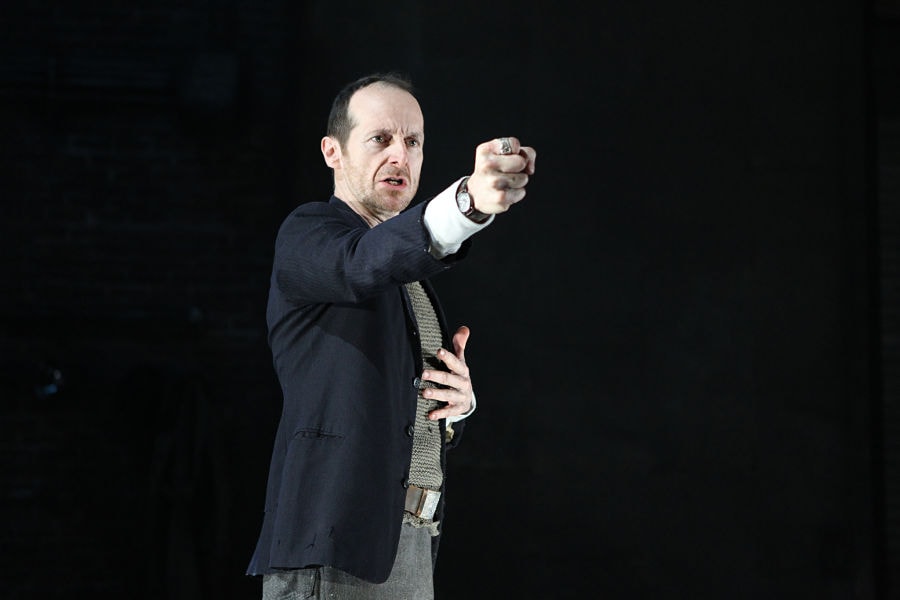
Invisible and Irresistible
Jason Rohrer, theatre critic, Stage and Cinema, Los Angeles: Denis O’Hare’s An Iliad, which I saw at the Broad Stage in Santa Monica, was the show that had the most powerful effect on me this year. A one-man interpretation of a canonical work, adapted (with director Lisa Peterson) with great scholarship, rigorously and flawlessly executed, deeply political and yet with its agenda rooted so deeply as to be both invisible and irresistible; this was as smart a play about war as I expect to see. Performer as exemplar. Writer as exciter. Entertainment as sustenance.
Ladies Take the Prize
Karen D’Souza, theatre critic/reporter, The San Jose Mercury News, California : I’m a huge fan of Annie Baker, so being a part of the drama jury that awarded her the Pulitzer Prize for The Flick was one of the highlights of the year for me. I was also heartened by what a tremendous year it was for women playwrights in general. All three of our nominees this year were women: Baker, Lisa Kron and Madeleine George.
In With the New
August Krickel, theatre critic, Onstage Columbia, South Carolina: At least 10 local theatres have produced new, original work this past year, including Columbia Children’s Theatre (CCT), which regularly re-imagines fairy tales in the irreverent, improvisational commedia dell’arte style. Jerry Stevenson’s Commedia Snow White included enough topical satire and double entendre to keep parents in stitches while their kids enjoyed the traditional storyline, and the recent premiere of Jack Frost, by Crystal Aldamuy and Paul Lindley II (who also played the title role) featured a surprisingly complex and melodic score from Lindley. CCT has added “Late Night Date Nights for Mom and Dad,” with professional adult actors in the same roles and costumes, but performing a PG-13 version of the current show; these grown-ups-only evening shows include adult beverages, and are developing a cult following among the hip local theatre crowd.
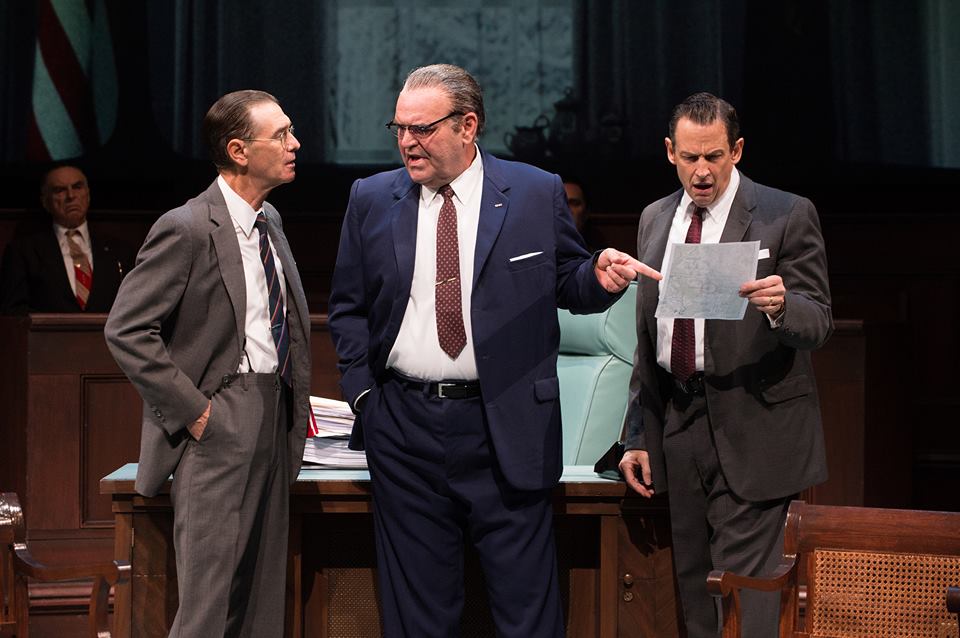
LBJ Times Two
Misha Berson, theatre critic/reporter, The Seattle Times: Robert Schenkkan’s duology about LBJ’s presidency, All the Way and The Great Society, plays in rep and in marathon performances (through Jan. 4, 2015) at Seattle Repertory Theatre, and it’s broken all Rep box-office records. These gripping, revealing and potent portraits of LBJ’s achievements in Civil Rights and his downfall in Vietnam fascinated and moved viewers of several generations. It’s rare when contemporary drama delves so deeply and tellingly into modern American history, and shows how the past seeds the present.
South Florida Rising
Bill Hirschman, editor and chief critic, Florida Theater On Stage: The real pleasure of 2014 has been journalistically and critically charting the continuing rise of South Florida as a hub for outstanding, if nationally unsung regional theatre. There’s a surprisingly wide array of work encompassing world premieres from local and national playwrights, deconstructed classic warhorses and local productions of shows that closed in New York a few months earlier. A few companies have closed, but several others have opened and thrived as part of, sadly, the best kept secret in American theatre.
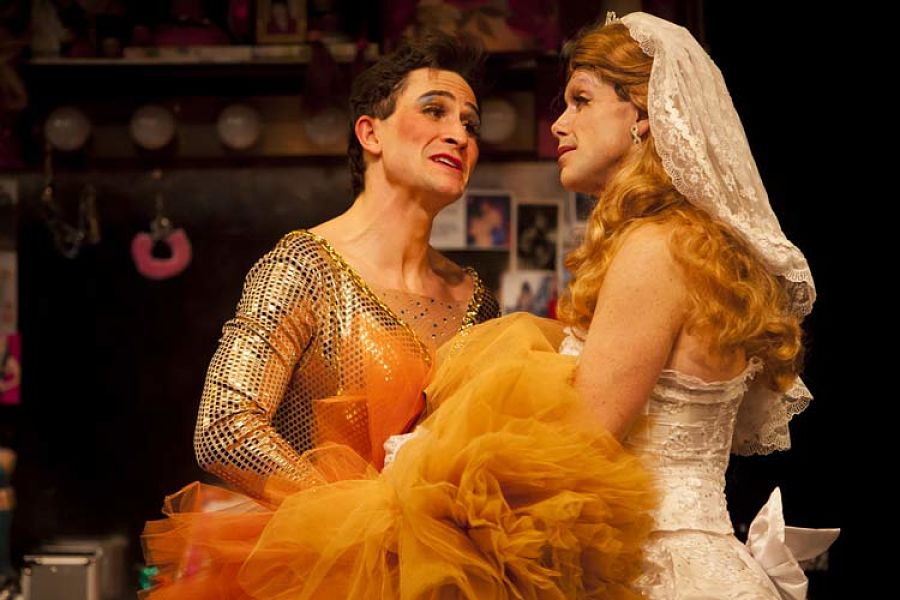
A Drag Party and Dark Matter
Chloe Veltman, arts editor, Colorado Public Radio: Matthew Lopez’s feisty The Legend of Georgia McBride at the Denver Center Theatre Company was very memorable. Lopez’s play tells the story of an Elvis impersonator who cross(dress)es over to the world of drag performance. Snappy dialogue, lively performances, and a dance party at the end. I am excited that Lopez is now DCTC’s resident playwright. I think he’ll help to put Denver even more strongly on the map for new plays.
I also got to see a preview of an interesting new collaboration between the Fiske Planetarium at the University of Colorado Boulder and the Boulder Ensemble Theatre Company. The two organizations are collaborating on a play by William C. Kovacsik about the discovery of “dark matter”—a substance which makes up something like 90 percent of the universe—by astronomer Vera Rubin in the 1960s. In the preview, the actors performed a few lively scenes in which Rubin exchanged words with the ghost of Sir Isaac Newton. The actors interacted in unusual ways with beautiful animated projection on the planetarium dome. I can’t wait till the full show premieres at the Planetarium in the summer of next year.
The Art of Understatement
John Moore, senior arts journalist, Denver Center Theatre Company: Sharr White’s Annapurna at Boulder Ensemble Theatre Company opens with a damaged ex-wife showing up at the door of her bare-butted ex-husband’s squalid Colorado mountain motor home, suitcases in hand. They haven’t laid eyes on each other in 20 years, but it’s soon evident the bruises on the woman’s arms aren’t the only contusions lingering just under the surface. This reunion serves as a necessary final reckoning neither of them saw coming. This detailed, humane character study was delivered by actors Kate Gleason and Chris Kendall like a master class in restraint. Drifting between hair-trigger anger and a lingering compassion for a broken-down addict now hooked up to oxygen, Gleason and her equal stage partner slowly revealed the terrible secrets that explain all the hurt that has built up between them like poison seeping out of a leaky gas line. Annapurna was an expertly written and utterly relatable look at love, loss and failed relationships. And Gleason’s performance, in particular, spoke volumes about the art of understatement.
An English Our Town
Erin Keane, entertainment/culture writer, Salon, Louisville, Ky.: It took Les Waters, an Englishman who had never seen a production of Our Town, to make this show work for me. His version at Actors Theatre of Louisville was a sensitive, beautiful and unsentimental production that honored Wilder’s groundbreaking spirit and offered innovative gestures that were wholly Waters’ own.

